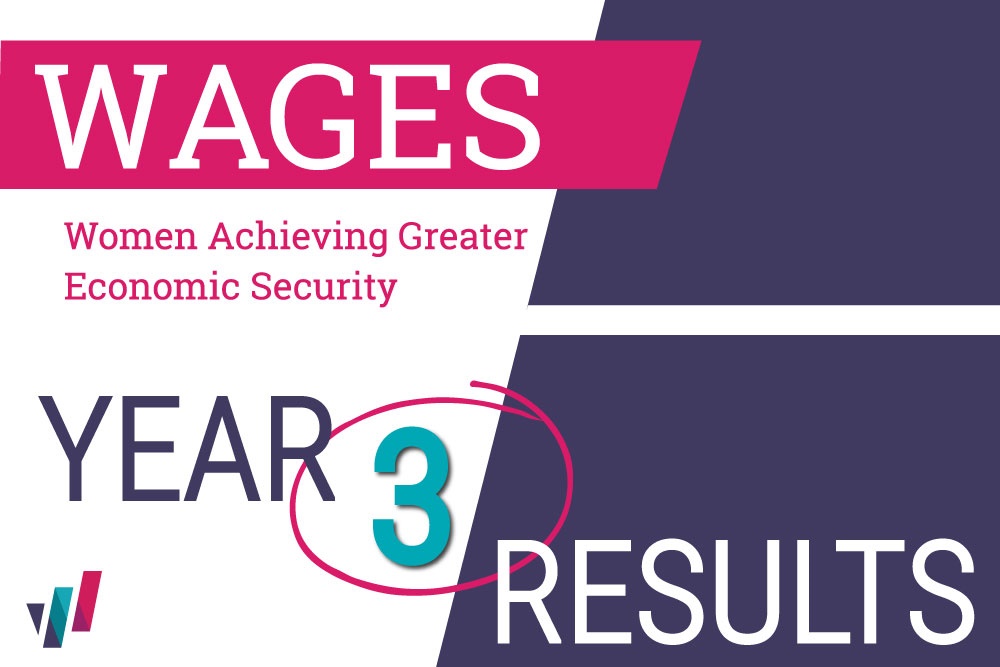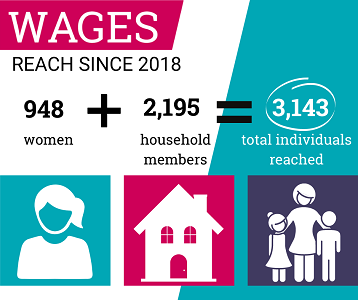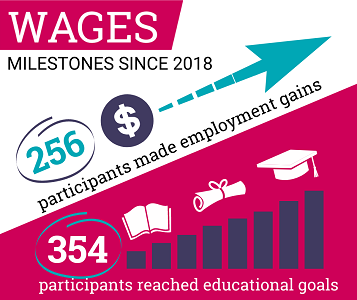
Year 3 Results: Women Achieving Greater Economic Security
We Know What It Takes to Move Women Forward
Flexible and holistic resources are a key lever
After three years of working with our 23 grantee partners, our understanding of what it takes for women to advance economically is in sharper focus. The ongoing work of our 15 direct-service partners and 8 public policy partners, especially the program adaptations they made during the pandemic, show that flexible and holistic resources are key levers for women to pursue economic advancement.
The Women’s Foundation of Colorado’s WAGES (Women Achieving Greater Economic Security) cohort works to achieve gender, racial, and economic equity for all 2.85 million women and girls who live in Colorado. The cohort is unique in that WFCO invests in and connects direct-service and public policy grantee partners to move our mission forward.
“The Women’s Foundation knows that both types of grantees are absolutely essential in driving long-term, sustainable change for women,” said Louise Myrland, vice president of programs. “The lived experiences of the women who work with our direct-service grantees help our policy partners prioritize issues that make the greatest impact in their lives. Additionally, our grantee partners learn from each other how to improve COVID responses and programming.”
Direct-service highlights
Since 2018, WAGES direct-service partners have helped women meet their families’ basic needs while building necessary skills for career advancement. In total, their work reached 948 women and 2,195 household members.
Although the events of 2020 created challenges for WAGES participants, many were still able to achieve success while learning new skills to keep their families afloat. Over the past three years:
- 256 participants made employment gains, 39% of whom were unemployed and attained employment and 23% of whom achieved across- or within-sector gains, e.g. a job change or promotion.
- 354 participants reached educational goals, 26% of whom obtained a high school diploma or GED, 17% of whom received a professional certification, and 10% of whom obtained a college degree.
Direct-service grantee partners identified the following strategies as important in their participants’ progress:
- Dedicated case managers to help women connect with resources in their communities
- Flexible training programs to develop technical and social skills to advance their careers and earnings
- Cash assistance to supplement, not replace incomes
- Solutions for digital access barriers
- Mental health support to address chronic stressors
- Community partnerships for holistic support
- Relationship building and peer support
Cash assistance especially beneficial
 Among these strategies, cash assistance emerged as especially beneficial. So much so that our WINcome grantmaking program that kicks off in 2021 (after the fourth year of WAGES) makes cash assistance a cornerstone.
Among these strategies, cash assistance emerged as especially beneficial. So much so that our WINcome grantmaking program that kicks off in 2021 (after the fourth year of WAGES) makes cash assistance a cornerstone.
“The difference maker in many cases is women having dollars in their pocket to address their needs so they don’t slide backwards when they encounter the cliff effect. We want to make sure that an unexpected car repair doesn’t unravel everything and lead to a job loss or even homelessness,” said Myrland. “We must trust women to make the financial decisions that are needed for their situations and their families.”
Public policy highlights
Public policy can shift the entire context in which Colorado women work, live, and have equitable opportunities to thrive. In 2021, WAGES policy partners and WFCO helped pass legislation that makes greater investments in early care and education; improves affordable housing resources; and establishes paid family and medical leave insurance for workers.”
Since 2018, WAGES policy partners have passed more than 50 bills that create opportunity and remove systemic barriers that Colorado women of every background and identity face. These wins come in critical areas including housing, transportation, child care, food assistance, healthcare – including maternal health, equal pay, employment protections/resources, and paid leave.
Policy partners identified the following policy advocacy strategies as important in creating meaningful change for women:
- Fostering bipartisan support and demonstrating how issues are interconnected
- Sharing research broadly in ways that are relatable to non-policy experts
- Engaging the community, particularly those with lived experiences around the issues
- Calling attention to racial inequities exacerbated by COVID-19, especially for women of color
- Advocating for sustainable ways to increase worker benefits and wages
“Our current systems, including tax policies, make it nearly impossible for single moms, immigrants, women of color, and many other groups to get out of poverty, let alone reach economic security,” said Myrland. “We’ve made tremendous gains for all women since 2018. However, there’s still much work to do to ensure that women are able to contribute their abundant skills and talents to our workforce, communities, and economy.”
What’s next for WAGES and WINcome
WAGES direct-service and public policy grantee partners are in their fourth and final year as a cohort. A final summary of the cohort’s work will be shared in 2022. In the meantime, WFCO will share our year-three learnings with policy makers and funders to help them understand what diverse women really need to move away from the economic edge toward economic prosperity.
“It’s up to us to make sure they are incorporating our findings into the systems and policies they create for our state,” said Myrland. “We need to make sure the bills that we’ve worked so hard to pass are now implemented with gender, racial, and economic equity in mind. New systems like paid family and medical leave cannot cut corners for women of color.”
WFCO is in the midst of reviewing grant applications for our WINcome grantmaking program. Direct-service and public policy grantees will be selected and notified by the end of 2021.
“The caliber of the diverse organizations that applied for WINcome grants is truly inspiring,” said Julie Groves, WFCO trustee, and chair of the direct-service grantmaking committee. “We are confident that the WINcome grantee partners will be innovative and relentless in moving Colorado women and their families forward and we’re looking forward to seeing those outcomes.”
As our WINcome grant strategy moves forward, we will similarly share our learnings.
Read the entire 3-year report or our executive summary here.
Thank you
We appreciate all of the contributions from individuals, corporations, and foundations that support WFCO’s operations, which help to make our WAGES work possible, as well as our partners who invest directly in WAGES, including:
- The Chambers Fund, a donor-advised fund of The Women’s Foundation of Colorado
- S&P Global Foundation
- Women’s Funding Network Women’s Economic Mobility Hubs project funded by the Bill & Melinda Gates Foundation
- WomenGive – United Way of Larimer County
- Nan Williamson
We also thank our direct-service grantmaking committee and public policy committee for their leadership.
To invest in our WINcome grantmaking program, click here.


